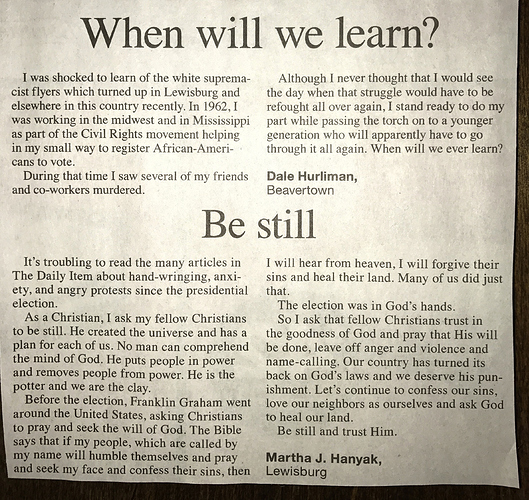This piece was originally presented by the author at State of Emergency: Politics, Aesthetics, Trumpism, a public forum that took place at New York University on December 10, 2016.
Text by Benj Gerdes
The above image is of two letters to the editor clipped by my father on November 24, 2016 from The Daily Item, a newspaper covering several small towns in a rural area of central Pennsylvania that includes my hometown of Lewisburg (population just shy of six thousand). The first letter references white supremacist flyers distributed in the town in the weeks following the presidential election. While not an unimaginable occurrence at other points in my lifetime, this is at least rare if not unprecedented. I hope these letters, taken together, may complicate some of the generalizations about the homogeneity of “red states” or even “red” counties. I find the second letter both familiar and frightening. I offer it in response to the post-election stated interest of many liberals: in reaching out to “them,” trying to understand “them.” Don’t. Please instead help us build coalitions around racial, environmental, and economic justice that can outnumber and overwhelm them.
I am someone who organizes with communists and anarchists but phone banks and canvasses for Democrats. Without claiming too much for myself, I’ll say my relationship to caring about electoral politics begins in the same place as my practice as an artist, teacher, and activist. Early exposure to intolerance and discrimination, as well as adolescent work with an older group of social justice activists in an often hostile climate, continues to inform me. I left this region in the mid-Nineties. Several visits this year allowed me to witness a phenomenon: the bigger and newer the pickup truck, the more likely it was to bear a sticker for the now president-elect. After many years when I wondered if everything I’d remembered was overblown, almost imagined, here was the defiant white male asshole vibe, back from many years of subdued life at the margins.
In the same way that I, now as a professor at a university on Long Island, have students who confess to voting for Trump but say they’d rather have voted for Bernie, there are many rational contradictions that have been discussed in the aftermath of the election. Thinking about communicating broadly, I’m going to call one of them a Free-Floating Fuck You Affect. This is an affect without a particular politics or sense, a Fuck You vibe searching for attachments. In recent, particularly post-election, coverage of addiction and substance abuse in rural America, little I’ve seen has actually addressed boredom in the lives people lead, that sense of getting fucked up because there’s little else going on. Attending the K–12 public school system in Central Pennsylvania, I was harassed and at least threatened (sometimes more) with physical violence for being different, for being into art, or for being “enough of a nerd” to be admitted to a highly selective university, with the last example having an overt element of class tension that I didn’t understand at the time—not between “elites” and “the middle class” but between youth with geographic, educational, and potential class mobility, and those whose horizons were likely to remain local. The aggressors were right, we wanted to leave them behind. At the same time, a handful of us unpopular, nerdy rejects could string together a few Smashing Pumpkins and Green Day covers, write original songs that were supposed to be punk but may have sounded more like Phish or Zappa, and then routinely draw crowds of over two hundred kids to all-ages shows in a cinder block community center. This was cross-class and not the college prep crew. There were so few other outlets.
I believe there is hope in this because it is so unfocused. Call it a very fragile coalition that has assisted a heavily leveraged buyout of the federal government. See it as something that can be further organized or disorganized. Take the painful reemergence, as journalist Michelle Chen describes, of one portion of the electorate who appear to not feel empowered except through the disempowerment or exclusion of others. If we are to engage with whiteness in its many regional instantiations, we must reach out not to cater to regression and re-segregation but to seek legitimate and compelling alliances. Outlets. We must also sabotage and dissolve last-gasp maneuvers of white privilege and racial preference in the next administration through both opposition and infiltration. Particularly if you can look like a Republican on paper, by playing the sad tools of white (white) collar bureaucracy against itself, there are plenty of legal and nonviolent ways to slow this thing down.
